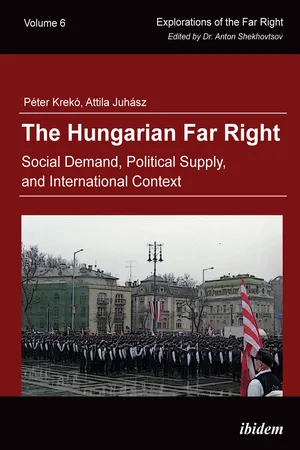![]()
Demand for the ideology
of the far right in Hungary
In this chapter, we are trying to give a general picture on the social climate in Hungary that helped the resurgence of the most powerful far-right force of Central Eastern Europe. The Hungarian figures will be examined in international context.
A tool for measuring social demand for the far right: The DEREX index
In order to assess the general social demand for the radical right in Hungary and beyond, analysts of Political Capital Institute invented a measurement tool called Demand for Right-Wing Extremism index (DEREX, for the detailed description, see Krekó, Juhász, and Molnár, 2011). DEREX is a percent-based indicator: it shows the percentage of respondents who in a given society are psychologically (based on their attitudes and values, not their personality) predisposed to adopt traditionalist, chauvinist, authoritarian, and antiestablishment ideologies and related political acts. This is to say the potential percentage of supporters of the far right whom we even called “attitude radicals.” Political Capital Institute designed its structured DEREX index using its own theoretical model and data from the European Social Survey (ESS), a biannual study that tracks changes in societal attitudes and values in thirty-three countries in Europe. The hierarchical structure of the index can be seen in Figure 1, the detailed methodology of which is provided the Appendix.
Figure 1: Structure of the Demand
for Right-Wing Extremism index
Our definition of right-wing extremism is thus based upon both ideological and psychological elements. In the opinion of practically all researchers of the subject, the first three subindices (prejudice and welfare chauvinism, right-wing value orientation, and antiestablishment attitudes) are inherent parts of far-right ideology. These are practically the demand-side aspects of the three ideological components on the supply side of the populist radical right according to Mudde (2007): nativism, populism, and authoritarianism. The fourth component (fear, distrust, and pessimism) includes emotional factors that typically fuel the first three components, according to previous research.
A country’s DEREX score is determined by the rate of respondents who belong to at least three of the four categories: for example, respondents who express anti-immigrant sentiments, antiestablishment attitudes, and right-wing values all at once. Using these strict criteria, the DEREX index examines the percentage of people whose extremist views could destabilize a country’s political and economic system—if these views continue to gain credence.
The four subindices are the following.
Prejudice and welfare chauvinism
This subindex includes respondents who, based on the established set of criteria, would limit the rights of homosexuals, would deny immigrants from other countries and poor countries to enter Hungary and/or those convinced that for at least two out of three reasons (economic, cultural, and general “livability” considerations) immigration would be highly detrimental to their country. This includes two key components: opposition to immigration and homophobia. For all practical purposes, according to the far-right concept, the first of the two is an integral part of all extreme right-wing ideologies. Mudde (2000) describes this factor as “racism” and “xenophobia,” and then “nativism” (Mudde, 2007). Meijerink, Mudde, and Van Holsteyn (1998) refer to the same as “exclusionism” and Falter and Schumann (1988) as “ethnocentrism.” While most approaches focus on far-right discrimination based on race, a number of authors emphasize that this is intrinsically linked to a predisposition to discriminate other groups as well. Regarding the conceptual/ideological correlation, belonging to an ideal far-right community requires not only racial but also a set of additional “exclusivity” and “inclusivity” criteria (Minkenberg, 2009); the desire to discriminate is not limited to other racial/national groups, but extends to people with different religious or sexual orientation as well (Muižnieks, 2005). A number of studies have shown that there is a widespread proclivity—some kind of prejudice factor—underlying the rejection of outside groups. A general bias against outside groups, the desire to create a racial and cultural uniformity and preserve a hierarchical social order, plays a major role in the latest conceptual and operational approach to authoritarianism (e.g., right-wing authoritarianism [Altemeyer, 1981] or social dominance orientation [Sidanius and Pratto, 2005]).
Right-wing value orientation
This index i...

